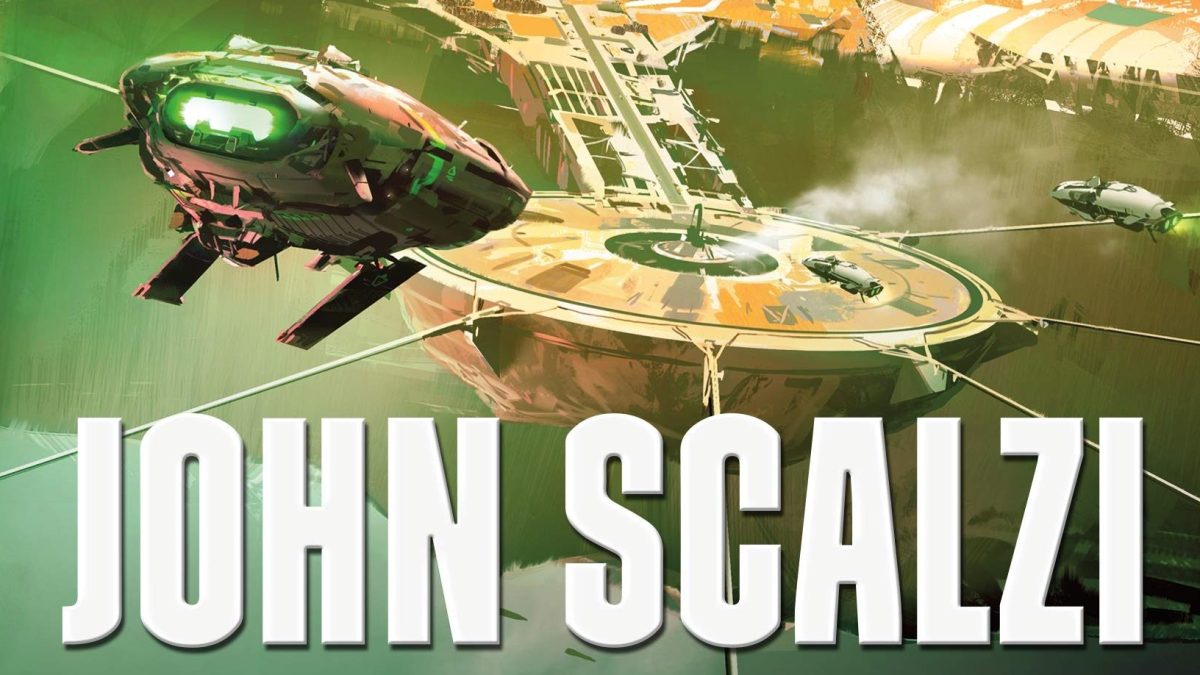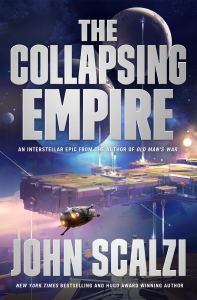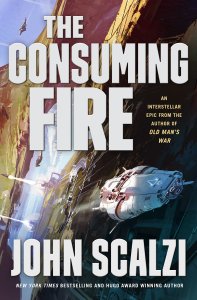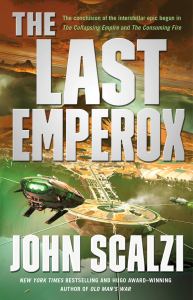Caring When the Universe Doesn’t: An Interview with John Scalzi
Author John Scalzi talks The Last Emperox, how to write when the world is on fire, and the value of characters who don’t know what they’re doing.

This post is sponsored by Tor Books.
The publication of John Scalzi’s The Last Emperox doesn’t just conclude the Interdependency series (which began with 2017’s The Collapsing Empire and continued with 2018’s The Consuming Fire), it also marks the completion of the first trilogy of the landmark deal that Scalzi signed with Tor Books in 2015: 13 books over a decade, for $3.4 million (a fourth novel, Head On, has also been published since the deal was struck).
The space opera series, set 1,500 years in the future and far from Earth, takes place within an Interdependency of planetary systems linked by the extradimensional, river-like Flow. But when the Flow threatens to disappear and isolate these systems from one another, it’s up to Emperox Grayland II (a.k.a. Cardenia Wu-Patrick), scientist Marce Claremont, and guild merchant Kiva Lagos to convince the Interdependency to get past their denial to acknowledge the threat and figure out how to reform their entire culture… all while fending off aspiring emperox Nadashe and the rest of her Lannister-esque Nohamapetan family.
Scalzi swears that, when he pitched this series in 2014, he could in no way anticipate how relevant it would feel to the current moment. Yet, even as the second and third installments have increasingly reflected the last few years’ mounting panic and renewed need for change, what is most compelling about the Interdependency, and what has been there from the start, is the core trio. Though thrust into uncertain situations in The Collapsing Empire, each has risen to the occasion in satisfying and heartbreaking ways—as it should be with the end of a series.
Den of Geek spoke with Scalzi about The Last Emperox, from dealing with uncaring universes to writing fun villains and beyond.

Den of Geek: Did the pressure of the Tor deal weigh on you while writing The Last Emperox? How does it feel to be finished?
John Scalzi: There wasn’t a pressure in terms of the expectation. There wasn’t Tor sitting there saying to me, “Perform, monkey, perform!” It was more, “Now that you have this and you have the security of knowing basically what you’re gonna do for the next ten years, how are you gonna take advantage of that?” And in fact, the Interdependency series is a great example of how I took advantage of that. I knew going in that I was going to be writing a multi-book series; I knew that I would have the luxury of finishing that series, because not every time that you start a trilogy, as a writer, are you absolutely certain that you’ll get to that third book, or fourth book, or however many books in a series there are. Because so much is dependent on sales and audience response and everything else like that, it’s so often the case that you’ll get to two books in and the first two books won’t sell particularly well, or you’ll have people go, “Well, I don’t read trilogies until they’re all turned in,” which means that the trilogy never finishes. But having that luxury of knowing that, no matter what, I’m gonna be able to get to that final book and pay off everything actually made it easier to write.
The most difficult thing is not about pressure from the contract and the need to perform in that respect. The major issue is that as soon as I signed the contract, basically the world turned to shit, and I’ve been trying to write basically a book a year during a period of time where the entire world wants to pull my focus to what’s going on outside of my office. It’s certainly not just me, in that case; it’s all writers, all creative people, dealing with the madness that we have to deal with; and every year of that has been like, “Well, maybe this year things will settle down.”
It’s much less about the expectations of the contract than it is about the realities of trying to be creative in the world that we live in today.
To that end, what advice do you have for people—both artists/creatives and otherwise—struggling to find that focus in this current situation?
The secret that I had to eventually surrender to—because I fought it every step of the way, because I am not a smart man—is that process actually helps. So when I was writing The Last Emperox, what I ended up doing was every day from 8 to 12, I used the Freedom app, which shut me out of Twitter and Facebook and news sites and everything that can basically pull my distraction; and I basically trained myself so that from 8 til noon I couldn’t access anything else, so I might as well get my work done. Having that as a regular thing—you can’t see what the world’s doing, and you can’t weigh in, and it doesn’t matter if you do anyways, so you might as well do your work—meant that every day when I woke up, my brain eventually set itself to “well, I guess I have to do this thing, which is to be creative,” so it got used to doing that and created a muscle memory. That made a huge difference.
And I resent my brain that it requires me to use an external app to block out social media and news in order for me to get my actual work done, but I have to be honest with myself and I have to recognize that that is an aspect of my brain. It wants to run to the trouble, wants to run to the excitement, wants to run to the adrenaline hit of whatever horrible bad thing is happening in the world today; and I have to just say, “No, you can’t.”
That’s what I suggest to everybody: Accept you are powerless over social media and find ways to keep yourself from accessing it; and routine really does matter.
On your Whatever blog, you describe how excited you were for people to read the book, and how excited you were to write it. What were you most excited to write in concluding this trilogy?
For me, a lot of it came down to being able to give resolution to particular characters. Like, we’ve taken a journey for basically three years since the release of The Collapsing Empire with Grayland, with Marce, with Kiva, and with the Nohamapetans. [We’ve] had them actually grow and have their own arcs, and now is the time where I have to pay off all the stuff they’ve done, and everything they’ve learned or didn’t learn, everything they decide is important for them to be doing.
For me as a creator, it was very satisfying to be able to again have the wherewithal across three books and the time to be thinking about the characters and what they would be doing and how they would be doing it, and to do what I hope will be satisfying actions and decisions and choices for each of them [so] that when people read them, sometimes they will be surprised, sometimes they will be outraged, but at all times they will be able to go, “OK, in the context of everything else, that makes sense with what that person’s doing.” And when they get to the close of the book, they can put it down and be like, “Yes, that all worked.”
I’m not one of those writers who is modest, I guess is the word for it, in the sense of—as I was writing it, it felt like I was going in the right direction. When I was finished, I was like, “Yes, this is the book that I meant to write. This is the trilogy I meant to write.” This is the one where it wasn’t an accidental trilogy, it wasn’t an accidental series—where I wrote one book and then was like, “Oh, they liked it, I guess I get to write more in this world.” It was very specifically “I’m going to do this over this amount of books, I’m gonna have these characters, here are the marks,” and specifically as a writer I hit the marks that I really felt like I wanted to hit.
As a person who is concerned with his own writing craft, it felt really good. It felt like this was the one where I felt I was most competent as a writer; I did what I wanted to do.
And because I did what I wanted to do and I had the emotions where I wanted them, the characters doing what I thought was necessary for them to do, when I was done with it, I was immediately like, “I need to show this to people!” I finished it in the very beginning of November, and at that point [my wife] Krissy had been reading all along, but there was no one else. I sent it off to my editor [Patrick Nielsen Hayden]. So what I did was something I almost never do, which is I gave it to some friends and [said], “I don’t normally do this until Patrick gets a first pass at it, but read this, this is cool!” They came back and were enthusiastic about it as well, which only sort of fed my feeling that I’d actually managed to do what I wanted to do.
[T]he idea [of] “Here’s a series where you will be satisfied at the end, even if you’re sad for the characters to go away,” that is a really good feeling. That’s why I’m super excited to have people read it, because I am like, “Your faith in me I think is going to be justified.”
Your main trio (Cardenia, Marce, and Kiva) are awkward and self-interested and profane—that is, normal people. How intentional was that in choosing who would be the main perspectives for this trilogy?
The thing about it is, for two reasons: one, I think as characters [it’s] more interesting to have people who are not absolutely certain that what they’re doing is the right thing to do. Or, recognizing that they have flaws, or recognizing that other people might see who they are as flawed, but fuck them, they’re gonna do it anyway—that’s Kiva, of course. I find those people more interesting than the ones who are full of destiny and moral certitude and stuff like that. If you’re going to have characters like that, you also have to recognize that those characters can be sometimes not-great people. One of the things about the Nohamapetans, even though I tried to keep them relatable as well, is they’re very clearly motivated by a sense of “There’s a way things should be, and there’s a destiny that we’re going towards—not in a prophecy sort of way, but in a way of how things work, we’re supposed to be at the top of the food chain, and by God I will make it happen!” So we do have those types of characters, but they are not necessarily the ones that you want to be leading the parade, so to speak.
But I also think, quite frankly, there’s also the coldblooded commercial writer aspect of, I don’t think that most people are going to relate to people who are certain all the time, or who [say] [dramatic voice] “This is what we must do and this is the way we will always do it, even if there is great sacrifice…” Most people really just are [saying], “Who thought it was a good idea to let me be an adult?”
This is something that I learned very early [in college]: I had that epiphany like, “Oh shit, nobody actually does know what they’re doing, there’s no point where you get to redeem your experience for ‘I know what I’m doing’ chips.”
Nobody knows what they’re doing, most people are making shit up as they go along, and this is not necessarily a bad thing. Because you do have to accept that the world is different from what you might have imagined it would be, and you have to be responsive to the changes in the world that are going on as they’re happening, and sometimes the things that you wanted are not going to be the things that are happening.Look at our current circumstances. The vast majority of people were not expecting to spend all of April in their house. The question then becomes, how do you work with this? How do you make this something where it isn’t just you surviving, but you rolling with it and doing something with it?
However you deal with it, the point of the fact is, no matter what your plans are, it never survives first contact with reality. I think it’s a lot more relatable for people to have characters who are constantly having to deal with the idea that reality is gonna mess with them, and their job is to roll with it and to make it work, and to find a way—in this particular case in this series—to save as many people as possible from a fate that they can’t control.

You have an incredibly memorable and dare we say fun villain in Nadashe Nohamapetan. Were there certain things you were aware of while writing her? How thoughtful did you feel you were in writing her, or was it more a matter of having fun writing an antagonist?
I think it’s a little bit of column A, a little bit of column B. If you’re gonna write a villain, you have to write a villain that is fun. I mean you don’t have to, but it certainly makes for a more interesting book, that you’re sitting there going, “I hate you, and yet I would totally have lunch with you.” I think that that is the magic of Nadashe, where you look at her and you’re like, “Aw man, you are nothing but trouble in an economy-sized bag, and yet! You are strangely compelling, and I would totally want to hang out with you for a little while until it became apparent that I really shouldn’t.”
One of the maxims that I do think is true, presuming that your character’s not actually in reality a complete sociopath, is that everybody is the hero of their own story. Nadashe understands that her motivations and her interests are not necessarily going to be condoned or supported by other people, and that in fact she may come across as evil or bad, but she does have a philosophical underpinning that is more than “Well, I just want to have things my way.” She really does believe that her role is to save the Interdependency in the context of what she thinks is the appropriate way to save the Interdependency, and in fact what it means to quote-unquote save the Interdependency. She understands that history may look back on her as a monster, but sometimes you need a monster to do a monstrous job.
Villains are more fun when you actually treat them with respect. You don’t always have to make them the hero of their own story; like I said, Nadashe is well aware that in most variations of how history will be told, she’s not going to necessarily be seen as a hero. But what she can say is, “I am the person who was needed at this juncture in history right now.” And that is a sufficient motivation.
Sex features prominently in this series as distraction, investigation, negotiation, sedition, etc. Was that a conscious choice?
Yes, in the sense of natural extensions of particular characters. I wasn’t often thinking about sex as “Oh, look at the time, it’s time for a sex scene” or anything like that. But when it made sense to have them express themselves in that way, absolutely. For example, with Cardenia—sex is gonna be sweet and awkward because she is sweet and awkward, and her relationship with her sexuality is still in many ways tentative. I think it’s reasonable to say that when she came into power she had not been a super experienced sexual being. It’s not that she never had sex, it’s not that she wasn’t interested in sex, but I don’t think that she understood what sex meant for her and how it’s incorporated into a part of her own psyche and her own life. And so when she found the partner that she did, and when she thought about that partner, a lot of it was wrapped up in sexuality as love, sexuality as attachment, all of those things. And all of those things are good, but they’re a very specific way of looking at sexuality.
Contrast that with Nadashe, contrast that with particularly Kiva, where sex is something very different. Kiva looks at sex in a very primal sense: ”I’m feeling anxious, I need to get laid, you will do, come here.” But over the course of the books, there becomes an added dimensionality to her sexuality where not only does it become this fulfillment of animal desire and stress relief, but it also starts developing a more emotional side as well. In that sort of sense, that was a really interesting way to signal that emotional growth with her relationship to her sexuality is mirrored by additional growth in her as a character.
Speaking more to Kiva’s character development: I can’t stop thinking about how she has a quasi-epiphany about existing in a time where civilization is crumbling and self-interest/selfishness won’t save humanity. What brought you, as the author, to this epiphany for one of your central characters?
I mean, have you seen the world? [laughs]
When I started writing the Interdependency series, I really wasn’t intentionally writing it with reference to what was going on in the world at the time. I conceived of it in 2014, which was long before the specific set of sociological and political issues that have come up in the last four years were brought to the fore. While you could say, oh there’s a parallel between what’s going on with the Flow and what’s going on with climate change, it was much more abstract. But the thing is, during the intermediary time between writing the first book and writing this last book, I had to live through the same rule-changing events that everybody else had to, and I couldn’t as a writer completely ignore what they were doing to me as a person, or to hermetically seal off the series I was writing and pretend there wasn’t gonna be some sort of repercussion from that.
There’s nothing wrong with being self-interested. There’s nothing wrong with saying, “I need to look at what this means for me and to some extent even what’s in it for me.” The very benign version of that we talk about with the metaphor of “Put the oxygen mask on yourself first before helping others.” And it’s rude [but] you can’t help others unless you are in a place where you’re able to be someone who can help others. So self-interest is not, in and of itself, necessarily a bad thing. It can become a bad thing, and it can become a thing where too much very clearly begins to injure the rest of the universe.
With the case of Kiva, she doesn’t want to have to change because it’s worked for her so far. The universe is falling apart, but her end of it seems to be chugging along actually pretty damn well, so she shouldn’t have to change. But she can see the necessity of needing fewer people like her and having to go, “Well shit, I guess I have to be the one to make that happen, because if I let someone else make it happen, then, quite frankly, I may have to be the one who has to change, and I don’t want that.” With her, that’s the epiphany: The extreme self-interest that she has can only happen at the very top of the pyramid, and the pyramid is shrinking. There’s only so much room at the top, and she’s gotta be the one who’s like, “Well, off you go.” [With] the journey that she takes in The Last Emperox what is absolutely true is that she resents every single step of the way the idea that she has to become the person who rises up to the occasion. She’s like, “Fuck, why can’t someone else do this?” But again and again, it’s, who else is it gonna be?
In that scene, she also ponders the fact that she lives in what she perceives as an uncaring universe. Do you believe that we live in an uncaring universe?
Absolutely, and I don’t think that that’s necessarily a bad thing. The way that I explain it to people is… People do get really sort of doom-y, “the world is ending”—no, the world’s gonna be fine. If something happens to humans and ninety percent of us disappear tomorrow, or one hundred percent of us disappear tomorrow, the damage we have wreaked upon the planet will exist for a certain amount of time. But then the world, if you wanna personify it, looks and goes, “OK, what do I have? I can make this work” and will do what it does.
The only thing that we have done to the planet that is going to essentially last until the sun turns into a red giant and consumes us all is the places where we have bored so far into the bedrock that tectonics will not make those disappear. That’s the only thing that will survive us, in that sort of sense. I’m not worried about the planet; the planet doesn’t need us. Mother Nature will be like, “Oh, I remember the humans, they gave me that really bad rash…” and then she will move forward with the pigeons or the cats or the rats or the squid or whatever and things will be fine. It will be a different world. The world is gonna be fine.
The world doesn’t care about us, but we should care about how we treat the world. Because if we don’t, then because the world doesn’t care about us, it will kill us. Or it will allow the damage that we have done to it to continue. Now, again, this is neither good nor bad; it’s simply a fact of the matter. Humans, because we have consciousness, because we put ourselves at the focus of our own lives, honestly believe that we matter and that it is important that we continue to exist. The Earth doesn’t have that opinion. The solar system doesn’t have that opinion. The galaxy doesn’t have that opinion, the universe doesn’t have that opinion… We are just ephemera. Again, this is neither good nor bad, it’s just a simple fact, but it’s really difficult for people to accept. Because everyone wants to be the hero of their own story, everybody wants our species to matter, everybody wants humanity to survive the planet and move out to the stars.
The world doesn’t care what happens to us. We have to care. If we don’t care, it doesn’t matter to the planet. It just doesn’t. So you might as well accept that and accept that any change that is gonna be made is going to be made by you rather than someone else doing something because “somebody should do something.” Congratulations, you’ve nominated yourself.
And if you won’t do it, well… It was a nice run that we had.

What can you tell us about the Interdependency TV series adaptation?
I can’t talk about it too much, mostly because I think they’re waiting to make some particular announcements, but I can say that things are ongoing, things are very positive. The people they have attached to it at this point are people that I think are going to do a very fine job with it.
What’s next in your deal with Tor?
Actually, I’m waiting to hear from Tor about what they want next. When I [signed] this deal, I basically went in with a sheet and said, “Here are these 13 projects that I would be ready to move on,” and I was expecting them to take, like, five of them, and they were like, “No, we will take them all!” And so now the question becomes, which of those makes sense for us to do next?
We had a project that we were gonna move forward on, which would be another sort of space opera thing, that would be maybe a little darker than what I normally do. But now comes the very real question of, does it make sense to do something that’s a little bit darker, a little more grim, or should we do something lighter because it’ll come out in 2021 and who knows where we’ll be in 2021? Will it be like, “Oh, a dark and grim thing, this is exactly what we need right now, ugh” or will we be like, “Oh wow, yes things are dark, but this is really exciting.” So we’re basically trying to prognosticate about where we’re gonna be a whole year [ahead of time]. […] We might want to say, no, let’s actually do something that’s lighter and that will make people laugh, because maybe in 2021 people want to laugh.
What I can say is, regardless, I will be writing something because I do still have nine books left in that contract, and that is—actually, these days especially—a very comforting thought, that no matter what I get to write another book, and a book after that, and a book after that.
This interview has been condensed and edited for clarity.
The Last Emperox is available April 14 from Tor Books.
